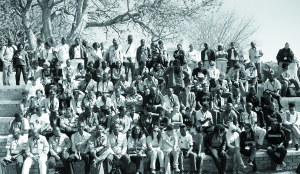By MAIMBOLWA MULIKELELA –
THE just-ended 18th edition of Highway Africa Conference in Grahamstown-South Africa, one of Africa’s largest gatherings of media practitioners and owners has reaffirmed the commitment to the growth
of journalism profession in Africa.
The conference with the theme: “Social media-from the margins to the mainstream,” explored how social media has impacted on all aspects of lives over the last 10 years.
More than 400 delegates from 36 African countries attended the conference including others from the United States (US), Bolivia, the Netherlands and Germany.
Further, the conference had a mix of panel discussions including social media and civic engagement, training workshops, book launches and the Data Journalism master class at the Rhodes University.
The journalism course provides mid-career business journalists with high level refresher course to report on complex financial matters.
Everyone has a byline when it comes to social media.
This is the new realities brought about by the information revolution in the name of social media.
Nowadays, people want their information instantly- whether it is via Facebook or any platform that delivers news in real time.
This however, pose challenges to the journalism professional because the profession is built around accuracy, fact checking, research, balance and fairness.
It is believed that the mainstream media have no choice but to respond to the new realities brought about by the information revolution
In Zambia for example, the introduction of social media by the community radio stations has helped improve service provision and involvement by locals in the affairs of their community.
PANOS Institute Southern Africa believe that the introduction of social media platform in the rural communities of Zambia was making significant contribution to the country’s development agenda.
On the other hand, the rise of social media has meant that opinion leaders have easy access to voters.
Social networking sites are widely credited as platform for social and political collaboration, organising and voter persuasion.
In South Africa, Facebook is a popular platform for social and political discussion and has over six million users, according to experts.
Globally, it has been pointed out that information technology had influenced the way in which business is conducted.
This has resulted in a faster turnaround of products and production, smart products and 24 hours shopping.
Some small business owners have embraced the use of social media platforms to enable them improve their customer experience and advertise their products and services on a relatively low budget.
The Highway Africa discussed how social media has impact differeny facets of our lives.
The Acting vice Chancellor Sizwe Mabizela at Rhodes Univetsity pointed out that the 18th edition of the Highway Africa was held at a time social media has fundamentally redefined the meaning of communication
and democratised access to and sharing of information, ideas and thoughts.
Dr Mabizela pointed out that this could not be more relevant to the continent as Africa emerge from a history of repressive regime to the one where technology was allowing a plurality of voices to be heard.
This demands the culture of openness, transparency, responsiveness and public accountability.
“The possibilities and limitations that the internet and social media have in the exercise of full citizenship was part of the conference agenda. Each person is now able tell his or her story to the whole world in his or her own words and or in his or her own way in a matter of seconds,” he said.
Commenting on the conference, Telkom group chief executive officer Sipho Maseko said social media was one of the most visible outgrowths of the internet pervasive influence.
“The internet had fundamentally transformed our society in the way we communicate, transact and offer services. The changing nature of technology is impacting your world of journalism and media,” he said.
Mr Maseko pointed out that Telkom values the role of journalists and the media in the development and sustenance of democracy in society.
Barclays Africa group head of communication Tim Kiy pointed out that the bank takes an active role in the development of Africa’s media.
“Our association with Highway Africa assists in empowering journalists with critical skills to be even better at their craft. We believe that a strong, effective and objective media is best placed to tell the
African story,” Mr Kiy said.
“Our 12 years partnership with Rhodes University through Highway Africa underscores our commitment to the economic and social development of the continent,” he noted.
South Africa National Planning, Performance, Monitoring and Evaluation Minister, Buti Manamela described Highway Africa as an opportunity for insides of the African media platform to be
challenged.







